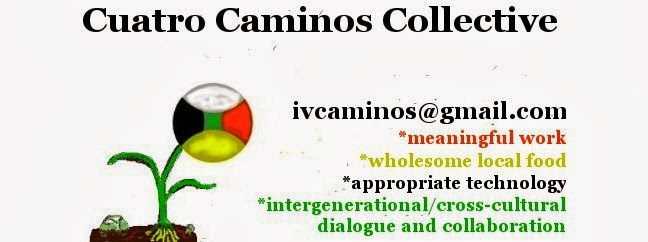Cuatro Caminos Collective
ivcaminos@gmail.com
562-448-2619
From: Thomas Wittman <info@eco-farm.org>
Date: Tue, 4 Sep 2012 15:16:34 -0400 (EDT)
To: <ivcaminos@gmail.com>
ReplyTo: info@eco-farm.org
Subject: In a surprising contradiction, Nestle official says GMOs aren' t necessary

Genetic Engineering News List
|
| | | | The Genetic Engineering News is produced by Thomas Wittman and the Ecological Farming Association, and supported by a generous donation from the Newman's Own Foundation. Please pass this vital information on. If you would like to get on this list go to www.eco-farm.org and select Newsletters. |
| In a surprising contradiction, Nestle official says GMOs aren't necessary
Though the corporate giant has donated more than $1M to fight GMO labeling, a
senior exec says we don't need modified foods
August 30, 2012
By Clare Leschin-Hoar
TakePart.com
http://www.takepart.com/article/2012/08/30/nestle-and-gmos
Overhearing someone say genetically modified crops aren't the solution for
feeding a planet ready to burst with 9 billion hungry mouths by 2050 isn't
surprising if it comes from a leader in the organics crowd. But it's positively
jaw-dropping when you hear it coming from a high-ranking corporate executive at
Nestle.
"Genetically modified (GM) food is unnecessary to feed the world and the food
industry would reap more benefits from using resources more sustainably and
employing other techniques. That's the view of Hans Johr, corporate head of
sustainable agriculture at Nestle and honorary president of SAI Platform, a
group of top global food and drink manufacturers working to improve supply chain
sustainability," writes Rod Addy for Food Navigator.
Johr wasn't talking about some of the traditional arguments against genetically
modified crops-like emerging superweeds, pest resistance, lack of long-term
studies on human health, or necessary increases in pesticide and herbicide use
due to resistance issues. Nope. Johr is talking about water. It's an issue that
concerns him, and with good reason. Nestlé purchases produce directly from more
than 680,000 farmers across the globe.
And, as we mentioned the other day, water availability is emerging as the
critical issue in how we're going to feed a burgeoning planet. Johr says if
water issues are addressed, the benefits will outweigh anything the genetic
modification of crops could offer.
Jonathan Foley, director of the Institute on the Environment (IonE) at the
University of Minnesota and co-author of a study released Wednesday on water
management and yield production, agrees with Johr that GMOs are not the answer
to food security.
"I don't think GMOs have contributed, or will likely contribute much, to food
security. Most of the GMO traits are focused on pest and herbicide resistance,
which is arguably a good thing, but are not improving yield characteristics all
that much (at least compared to conventional breeding, or better yet,
marker-assisted breeding). Furthermore, there are other approaches to managing
pests and weeds that would be equally (or more) effective, like not planting
such large monocultures in the first place," Foley tells TakePart.
Johr also went one step further, and addressed the issue of labeling.
"We [Nestle] have a very simple way of looking at GM: listen to what the
consumer wants. If they don't want it in products, you don't put it in them,"
Johr told Food Navigator.
Except, the funny thing is, no one seemed to have clued Nestle USA in on that
stance.
According to records kept by the California Secretary of State, Nestle USA made
four separate donations to the No on 37 Coalition, fighting against the labeling
of GMO ingredients in California. In a seven-week period, the company gave
nearly $1.17 million to prevent the measure from passing.
Nestle USA did not respond to our requests for comment.
Maybe that kind of corporate policy takes a while to trickle down, or perhaps
Johr was only speaking about countries with existing labeling laws. Nestle's
official policy on GM ingredients says: Provided their safety is proven, as
required for all ingredients, Nestle will continue to use ingredients derived
from genetically modified crops wherever appropriate.
Either way, at least someone at the world's biggest food and drink company (by
revenue) is seriously talking about these issues, and in a public way. It's a
start, and we'll take that.
|
| | | | | | |







No comments:
Post a Comment